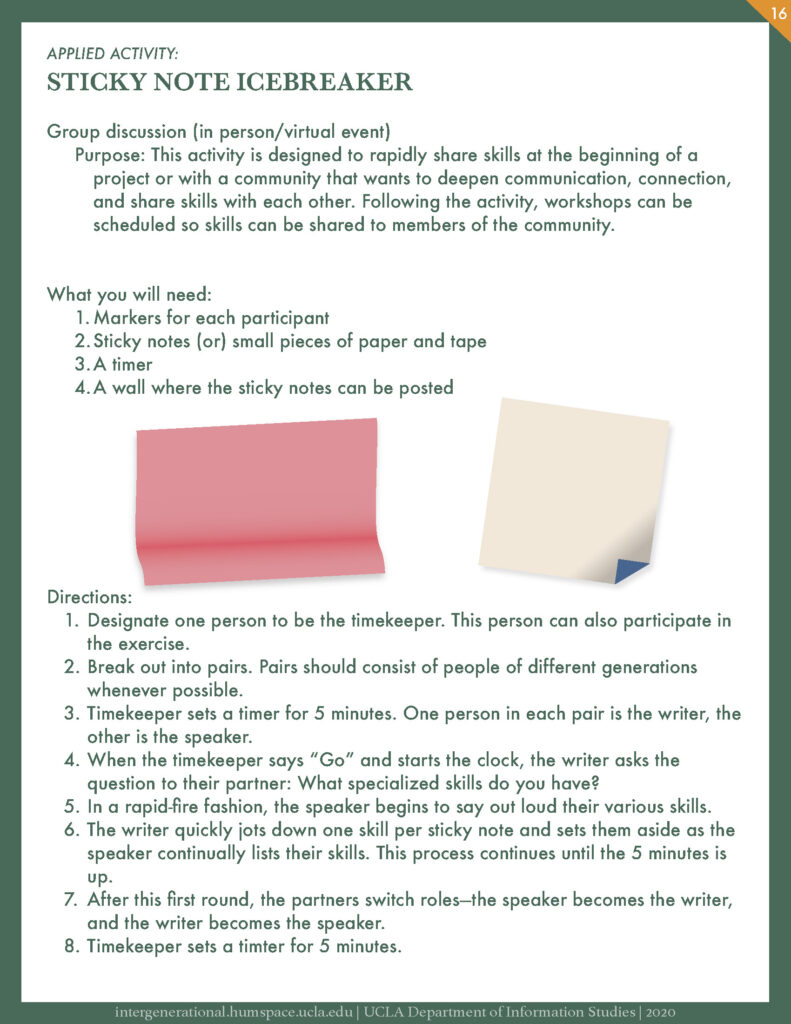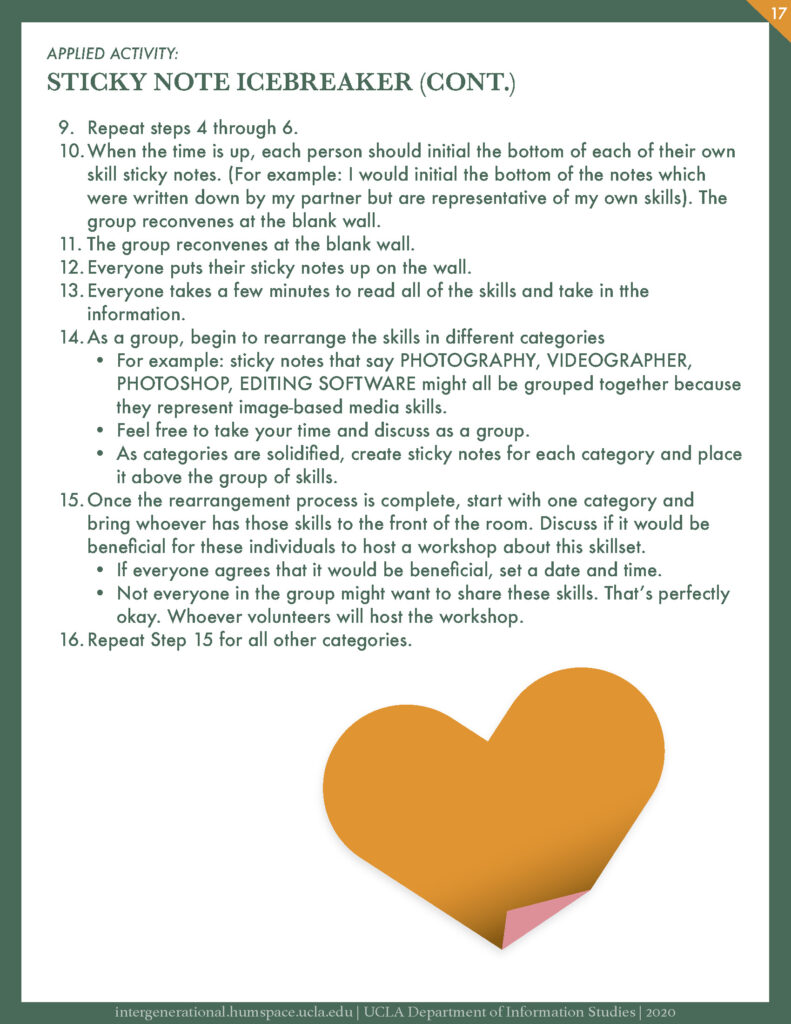Introduction
Sharing knowledge, skills, and stories across generational boundaries strengthens relationships and helps assure the long-term sustainability of community archives. There are a number of strategies and scalable actions that can be implemented in your organization to nurture a culture of knowledge and skill sharing on a consistent basis. Doing so will open up new creative possibilities and connections among the people within the community.
Strategies and actions:
- Encourage the practice of asking questions
- Collaborate on projects
- Host skill sharing workshops
- Facilitate story-telling community events
- Document the institutional knowledge of your community members
Encourage the practice of asking questions
Community-based archives thrive on the contributions of staff, volunteers, and community members. While archival work is often done individually, the practice of asking questions can spark an opportunity for collaboration in the form of skill and knowledge sharing. Creating an atmosphere of open-communication will give way to the ability to ask other team members questions when one is:
- Curious about the history of a collection or document within the archives
- In need of assistance on an archival project they are working on independently
- Wondering about the institutional history of the organization
- Looking to ask about board members’ histories and background with the organization
To encourage an “ask me anything” culture within your organization, management can make an effort to remind staff and volunteers that:
- There are no such thing as stupid questions
- Projects do not have to be completed in isolation
- There are a number of ways to get in touch with managers and board members. Share all of the ways to get in contact, such as: a phone call, a text, an email, a video-conferencing call, a socially-distanced meeting.
Other ways to encourage a culture of asking questions include:
- Allocating the last 10-15 minutes of board meetings for open questions
- Regularly remind team members that you are available as a resource
- Make time for one-on-one conversations with volunteers
- Ask others about their skillsets
- Remain curious and remember there is always something to learn from others
- Explicitly identify and practice as a space of care, hospitality, and inclusion
- Acknowledging that perfectionism is a construct of white supremacy culture and that the values of “working towards” as opposed to “working for perfection” promote a healthy work environment that allows people to reach out for help when needed.
If space allows, create a co-working area with regular community office hours. Doing so will encourage the opportunity to work in the same space, even if projects are different
Collaborate on projects
Whenever possible, collaborate on projects as a team of at least 2 people. Working together allows for the opportunity for a greater impact of creativity, knowledge sharing, and skill sharing.
When building a team, ask the following questions:
- What skills does each project member have?
- How will we divide the work?
- How will we communicate?
- How often will we communicate?
- What platforms will we use to share our progress?
- What is our timeline for completion?
Facilitate storytelling events
“When archives “pop up” and are visible outside the traditional walls of the archive that securely holds materials, they often feature a participatory and in-the-field documentation strategy wherein archivists, interns, and volunteers actively engage the public in oral history interviews. In this particular pop-up archive model, members of the public are urged to share stories bout already identified topics that align with a strategy created by the archive itself.”
—Elizabeth Bentley and Jamie A Lee with FARR, “Performing the Archival Body: Inciting Queered Feminist (Dis)locational Rhetorics Through Place-Based Pedagogies, pg. 188
Archives tell stories of lived experiences. Traces and remnants of work, joy, connection, despair, and desire live within written accounts of the page and imprints of vocal soundwaves on magnetic tape. Animating the archive through storytelling with the participation of youth and elders of a community is one way to interact and renew relationships with archival materials, and to bring these stories into the present tense. Consider hosting a cross-generational storytelling event in your community, such as:
- Host a community-based archival performance (see AQA POP-UP Archive in resource section for an example)
- Plan a storytelling event in public. Reclaim public space by using place making methods of participation and engagement.
- Facilitate a virtual storytelling event that invites creators of an archival collection to tell stories of how their materials came into existence, and how they ended up in the archives.
Pass along institutional knowledge
“There is a tacit mutual responsibility for elders to sit, reflect, and recall while younger generations commit to recording, processing, and analyzing the previous generations’ historical knowledge.”
—Horacio N. Roque Ramírez and Nan Alamilla Boyd, Introdcution: Close Encounters in the Body and Knowledge in Queer Oral History, pg 5.
Passing institutional knowledge onto younger community members ensures that the histories of elders lives on in the memory of the next generation. Modalities of remembering can be instituted by traditional modes of archival practice–such as recording oral histories and systematically cataloging written accounts of experience–however they do not need to be limited to these approaches. Place making strategies, (dis)locational rhetorics, and feminist and queer methodologies may be employed to share and remember the histories of elders within communities.
Host Skill Sharing Workshops
Skill sharing workshops offer a straightforward strategy for sharing expertise with other members of the community. Facilitation of a skill sharing workshop can be done by one or multiple members of the community, however organization and formats should be discussed ahead of time so that everyone involved can get the most value out of the experience as possible.
In the following section, a skill sharing workshop activity is described in detail. Focusing on one skill per workshop, this event is designed to imbue willing members with a new skill, taught by one of their own community members. Follow the directions of the activity, but feel free to modify as needed. All templates shared on this website provide a basic roadmap—consider the values, missions, and needs of your community members and omit, add, and re-imagine the template as you see best.
Activity


Resources
Watch
Performing the Archive, Refugee Council Archive of the University of East London
Read
Archival Legibility: Sustainability through Storytelling Across Generations by Jamie Ann Lee
How to Host a SkillShare and Shift the Culture of Your Community by Kendra Marie Hoffman
Research
Women’s Center for Creative Work Mission and Values
Queer Apocalyse Skillshare hosted by the Bakery Atlanta